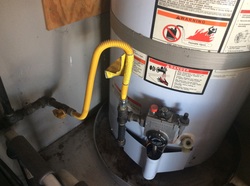On the one hand, the seller usually doesn't want to make any repairs, while the buyer views the long list of items generally found in an inspection as a fix-it list for the seller.
The third party in the love triangle is the home inspector themselves. While they are simply doing their jobs, one of the more annoying elements is pointing out items that are not up to current code (even though bringing an older house up to current code is not a requirement). Here are a few of my least favorites:
- No anti-tipping device on the kitchen stove. This is a fairly new one. I survived my entire childhood (as did my children) without once opening the oven door and standing on it, potentially tipping the stove over. I think vigilant parenting is a better answer. The device is a $5 item, but most handyman have never installed one because it didn't become a requirement until recently. They have to pull the stove out (without marring the kitchen floor), get behind the stove and attach one portion to the wall, and the other to the back of the stove (which may void the warranty, as it may require drilling into the back of the stove).
- No sediment trap on the gas line for gas appliances. This is a small "T" in the gas line that theoretically traps any sand or grit in the gas line prior to the gas entering the appliance. I've had gas appliances for 30 years in several properties and have never encountered that problem -- nor have I ever heard of anyone having that problem. But apparently, now it's a problem! Of the few that I've seen, most have been incorrectly installed -- so while they get an "A" for effort, an "F" on execution (but still likely is a solution in search of a problem).
- Extending the water heater temperature/pressure relief valve (TPR valve) to within 6" of the floor. Now in some cases, if one has to walk by the water heater frequently (like when going to your car in the garage, and the water heater is adjacent to the door) -- it makes perfect sense! No one needs a face full of scalding hot water should the valve decide to open at just that moment. But if your water heater is outside, in a recessed cabinet, or otherwise not in a right of way, as long as it is directed downwards (and not at face level) then that would seem adequate. Likewise, while code requires copper pipe, It would seem that PVC or even galvanized pipe would be suitable for the extremely brief period for which this pipe would ever be used.
- GFCIs - Ground Fault Circuit Interruptors (sometimes referred to as GFI's) - those outlets in the kitchen and bath with the small reset buttons on them. When I remodeled my kitchen and my baths, I installed them, but more so to keep the inspector happy than an innate fear of being electrocuted because I might drop my toaster or curling iron into a sink full of water. While I suspect that there have been some unfortunate incidents over the years, one wonders how many incidents are we preventing by requiring everyone to upgrade to GFCI outlets. Grounded outlets -- same story. Many of the items that we plug into outlets today aren't grounded anyway, so the inclusion of a ground wire in the outlet is a non-event. Sensitive electronics? They should have a grounded outlet.



 RSS Feed
RSS Feed